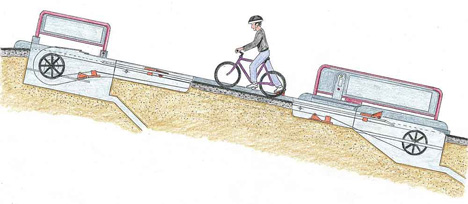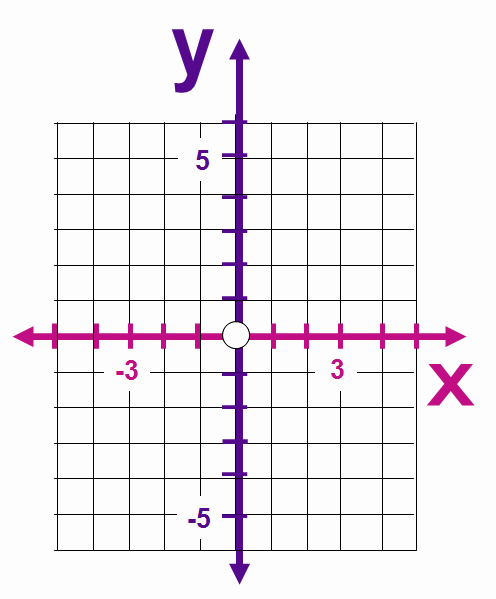
Copyright Image purchased from Photodune.com
Anyone who has ever ridden a bike uphill knows what a “Gradient” or “Slope” is all about !
But in Norway there is a clever way to save the hardship of big hills.
It’s called a “Bicycle Lift”, and is in Trondheim Norway.

Image Source: http://weburbanist.com
It is the world’s only functional bicycle lift, designed to help bike riders ascend the hill.

Image Source: http://weburbanist.com
The device is called a “Trampe” and opened in 1993. The hill it is on goes from the town center to the University. The “Trampe” has also become a major tourist attraction.
Basically you purchase tokens, then strap your foot into the escalator, and it pulls you up the hill.

Image Source: http://weburbanist.com
For the smoothest ascent the advice is to keep the right leg extended behind the body, shift the body weight to the footplate, and lean slightly forward on the bike.
So there is some weight distribution and balancing mathematics involved with the entire process.

Image Source: http://weburbanist.com
As can be seen in the diagram a continuous cable loop powers the lift, and it is driven along using electric motors with gears.
Definition of Gradient

Image Copyright 2013 by Passy’s World of Mathematics
The Mathematical value of a Gradient or Slope involves comparing how far up we have gone, against how far across.

Original Image Purchased from Photozone.com
Types of Gradient
There are four types of Gradient: Uphill, Downhill, Flat Horizontal, and Straight Up Vertical.
Mathematically we name these : Positive, Negative, Zero, and Infinite.
POSITIVE Gradients and Slopes go UPHILL from left to right.

Original Image Purchased from Photozone.com
NEGATIVE Gradients and Slopes go DOWNHILL from left to right.

Original Image Purchased from Photozone.com
ZERO Gradients and Slopes are FLAT or horizontal and do not go up or down.

Original Image Purchased from Photozone.com
INFINITE or UNDEFINED Gradient or Slope goes straight up, and is neither uphill or downhill.
This final type of Gradient or Slope is one which goes straight up.
A bike cannot be ridden vertically, but it can be stored in this position.
Because it cannot be ridden vertically, we call the slope or gradient “UNDEFINED”.

original image from http://www.thehappybike.com
Introductory Video About Gradient
The following video gives a really good overview of what Gradient is, and then does a basic straight line gradient question.
We highly recommend watching this video.
Gradient on Cartesian Plane
Numeric Values for Gradients are usually worked out using measurements between points that are located on a reference grid.
Usually this Reference Grid is an X-Y “Cartesian Plane”, and the points are (x,y) coordinates on this grid.

Image Copyright 2013 by Passy’s World of Mathematics
For our previous example, the Steepness or Gradient or Slope of the line connecting points A and B is 8/4 = 2.
We say the size of the uphill slope between the two points is “2”.
Because the direction of the line is uphill, the gradient is positive 2.

Image Copyright 2013 by Passy’s World of Mathematics
To calculate Gradient or Slope, we always draw a right angled triangle around our two points.
We then count “up” squares, and “across” squares.
There are examples on how to do this later in this lesson.
Note that there is also a “Formula” way of working out gradient or slope from a pair of (x,y) points, but this is covered in a separate lesson.
In this lesson we are only looking at finding gradient or slope by manually counting squares on an X-Y Grid.
More Videos About Gradient
Here is a quick thirty second video with a smiley face emoticon which shows the four different types of Gradients and Slopes.
This next video gives really good explanations, and covers word problems, but is not embeddable.
Click the image of the video, or the link below to go to youtube and watch the video.
Link to above video:
http://www.youtube.com/watch?v=jUC-azOrLNs
This next video shows how to calculate the Gradient Slope between two (x,y) points.
Here is another video about plotting two points, and then finding the Rise and Run and thereby calculating the Gradient.
This final video shows a real life example of how to calculate the Slope of a Building Block:
Gradient – Working Out Steps
The first step is to find two points to use.
If using a grid with squares, make sure the points are on the corners of squares so their coordinates are both whole numbers.
We then work out the Vertical and Horizontal Distances between the points. We can draw a right angled triangle connecting the points to do this.
Finally we put the Vertical and Horizontal Distances into the Gradient Formula m = rise / run and then simplify our final answer.

Image Copyright 2013 by Passy’s World of Mathematics
Gradient Slope Examples
In this first example, we have a line sloping uphill from left to right, and so our answer will be a Positive Gradient Slope value.

Image Copyright 2013 by Passy’s World of Mathematics
The next step is to work out the Rise and Run values.

Image Copyright 2013 by Passy’s World of Mathematics
We now substitute the Rise and Run values into the Gradient Formula, and obtain our final answer.

Image Copyright 2013 by Passy’s World of Mathematics
Gradient Slope – Example 2
In this second example, we have a Downhill Gradient Slope, and so we need to make our final answer Negative.

Image Copyright 2013 by Passy’s World of Mathematics
The next step is to work out the Rise and Run values.

Image Copyright 2013 by Passy’s World of Mathematics
We now substitute the Rise and Run values into the Gradient Formula, and obtain our final answer.
Because we have a Downhill line, we need to make the final answer Negative.

Image Copyright 2013 by Passy’s World of Mathematics
Gradient Slope – Example 3
In this third example, we have a Flat Horizontal Gradient Slope, and so our final answer will be Zero.

Image Copyright 2013 by Passy’s World of Mathematics
Gradient Types Summary
When doing questions, look for these four types of Gradient Slopes.
Memorising and Recognising these will help you setup your answer appropriately – Positive, Negative, Zero, or Undefined.

Image Copyright 2013 by Passy’s World of Mathematics
Gradient Slope of Parallel Lines
Parallel Lines always have identical Gradient Slopes.

Image Copyright 2013 by Passy’s World of Mathematics
This means that if we are told two lines have the same Gradient Slope, then they must be Parallel.
Gradient Slope of Perpendicular Lines
Perpendicular Lines are Lines which cross over each other at an angle of 90 degrees.
The Gradient Slope of two Perpendicular Lines are Negative Reciprocals of each other.

Image Copyright 2013 by Passy’s World of Mathematics
This means that if we have one gradient, we can work out the other one, by flipping it over and changing its sign.
Eg. The following Gradient Slopes are negative reciprocals, and would indicate that we have Perpendicular Lines.
2/3 and -3/2
2 = 2/1 and -1/2
3 and – 1/3
1/4 and -4
-4/5 and 5/4
8/7 and -7/8
Blank X-Y Grid
Here is a blank X-Y Grid you can print out and use for plotting question Points, and working out Gradient Slopes.

Image Copyright 2013 by Passy’s World of Mathematics
Gradient Worksheets
This first worksheet has some right triangles set up with measurements, and it is simply a matter of calculating the Rise / Run and simplifying the final answer.
This second worksheet gives line segments drawn on an X-Y Grid, and we need to add in right triangles to calculate the Rise and the Run.
This third worksheet is on Parallel and Perpendicular Lines.
This final worksheet is also on Parallel and Perpendicular Lines.
Gradient Games and Quizes
This first Online Activity is an interactive quiz where we can work up through a range of levels of difficulty.
Click the following link to play this Game
Gradient Slope Interactive Quiz
This next activity provides a series of Quiz Questions to answer online.
Click the following link to do the Quiz.
Interactive Gradient Slope Calculator
In this online activity we can carefull slide around the points to create any line we like, and its gradient will be calculated for us.
Click the following link to use this interactive.
(The interactive is about halfway down the web page)
Gradient Slope Interactive Calculator
Straight Line Between Two Points Calculator
All we have to do is enter the (x,y) coordinates of any two points and click “Go” and this online interactive will calculate the slope, find the rule for the line, and even plot the line for us on an X-Y Grid.
It also tells us about Parallel and Perpendicular Lines.
Click the following link to use this interactive.
http://www.mathsisfun.com/straight-line-graph-calculate.html
Related Items
The Cartesian Plane
Plotting Graphs from Horizontal Values Tables
Plotting a Linear Graph using a Rule Equation
Plotting Graphs from T-Tables of Values
Finding Linear Rules
Distance Between Two Points
Mountain Gradients
Real World Straight Line Graphs I
Real World Straight Line Graphs II
Subscribe
If you enjoyed this lesson, why not get a free subscription to our website.
You can then receive notifications of new pages directly to your email address.
Go to the subscribe area on the right hand sidebar, fill in your email address and then click the “Subscribe” button.
To find out exactly how free subscription works, click the following link:
If you would like to submit an idea for an article, or be a guest writer on our website, then please email us at the hotmail address shown in the right hand side bar of this page.
If you are a subscriber to Passy’s World of Mathematics, and would like to receive a free PowerPoint version of this lesson, that is 100% free to you as a Subscriber, then email us at the following address:
Please state in your email that you wish to obtain the free subscriber copy of the “Gradient and Slope” Powerpoint.
Feel free to link to any of our Lessons, share them on social networking sites, or use them on Learning Management Systems in Schools.
Like Us on Facebook
Our Facebook page has many additional items which are not posted to this website.
These include items of mathematical interest, funny math pictures and cartoons, as well as occassional glimpses into the personal life of “Passy”.
Check it out at the following link:
https://www.facebook.com/PassysWorldOfMathematics
While you are there, LIKE the page so you can receive our FB updates to your Facebook News Feed.
Help Passy’s World Grow
Each day Passy’s World provides hundreds of people with mathematics lessons free of charge.
Help us to maintain this free service and keep it growing.
Donate any amount from $2 upwards through PayPal by clicking the PayPal image below. Thank you!
PayPal does accept Credit Cards, but you will have to supply an email address and password so that PayPal can create a PayPal account for you to process the transaction through. There will be no processing fee charged to you by this action, as PayPal deducts a fee from your donation before it reaches Passy’s World.
Enjoy,
Passy










Pingback: Midpoint Between Two Points | Passy's World of Mathematics
Pingback: Gradient Slope Formula | Passy's World of Mathematics
Pingback: X and Y Intercepts | Passy's World of Mathematics
Pingback: Coordinates Bingo Game | Passy's World of Mathematics
Pingback: Gradient Slope Intercept Form | Passy's World of Mathematics